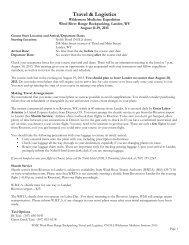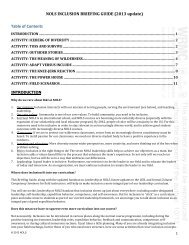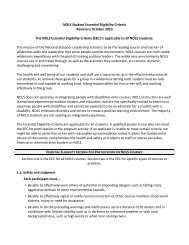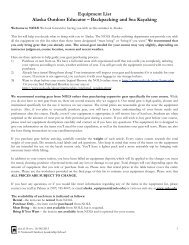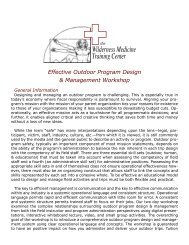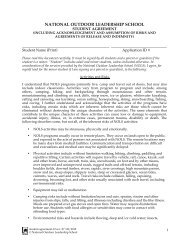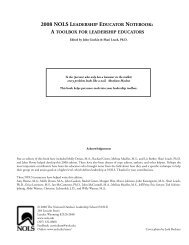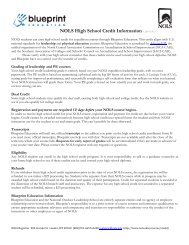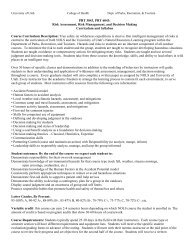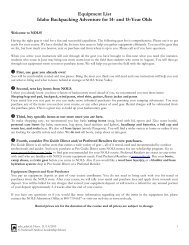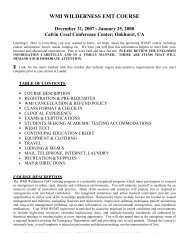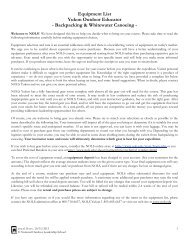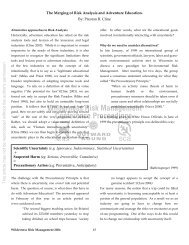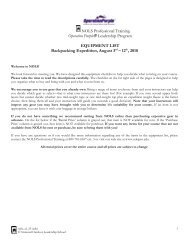NOLS New Zealand Instructor Course Information (NZIC)
NOLS New Zealand Instructor Course Information (NZIC)
NOLS New Zealand Instructor Course Information (NZIC)
You also want an ePaper? Increase the reach of your titles
YUMPU automatically turns print PDFs into web optimized ePapers that Google loves.
<strong>NOLS</strong> <strong>New</strong> <strong>Zealand</strong> <strong>Instructor</strong> <strong>Course</strong> <strong>Information</strong> (<strong>NZIC</strong>)<br />
The National Outdoor Leadership School’s <strong>Instructor</strong> <strong>Course</strong> is designed to train experienced outdoors people to be instructors at <strong>NOLS</strong> and at other<br />
wilderness-based outdoor education programs. This information sheet covers a range of topics relating to the instructor course: brief descriptions of our<br />
instructor courses, qualifications for applicants, the application and review process and timetable, and employment at <strong>NOLS</strong>. This information is meant to<br />
give a clear picture of the process and expectations involved in applying for and taking an instructor course. In addition we recommend that you review a<br />
current course catalog (or check out our web site) to gain an understanding of our overall mission and programs. If you have any questions after reading<br />
this information, please contact our admission office.<br />
A Profile of <strong>NOLS</strong><br />
<strong>NOLS</strong> is a private non-profit school focusing on experiential education in a wilderness setting. Our international headquarters is in Lander, Wyoming,<br />
with nine branch schools located in Alaska, Arizona, Idaho, Yukon Territory, Washington, Wyoming, Mexico (Baja), Australia/<strong>New</strong> <strong>Zealand</strong> and Chile<br />
(Patagonia.) We also have programs in India, Brazil, Argentina and Scandanavia. <strong>NOLS</strong> offers 70+ course types in wilderness areas worldwide for students<br />
from ages 14 to over 50. On our courses, instructors take groups of novices into remote wilderness settings for extended periods of time. In addition to<br />
student courses, we run trips for alumni, conferences and seminars on wilderness related educational topics, sponsor an extensive staff training program,<br />
conduct research and produce publications on environmental conservation, wilderness skills, risk management and leadership.<br />
Yearly we enroll 3,000+ students and employ approximately 500 instructors and 150+ full-time and part-time administrative and support service staff. We<br />
have more than 75,000 graduates and have certified over 1,600 instructors since our founding in 1965. We are actively seeking to diversify our students,<br />
instructors, and administration, and we have a scholarship program for women and minorities to directly support this goal.<br />
What is the <strong>Instructor</strong> <strong>Course</strong>?<br />
The <strong>NOLS</strong> <strong>Instructor</strong> <strong>Course</strong> (IC) is specifically designed for people interested in working as field instructors for <strong>NOLS</strong>. Other outdoor programs value<br />
employment applications from IC graduates. (Please note: the IC is not designed for novices; it is designed to teach people with extensive experience how<br />
to teach to novices in a wilderness expedition setting.) ICs are intensive training experiences in outdoor education, and all of them include an in-depth<br />
review of our “core curriculum” in five fundamental areas: risk management, leadership and teamwork, outdoor skills, environmental ethics, and<br />
wilderness education skills. The various ICs differ in the technical skills addressed, location, and environment. What follows is a brief summary of each IC.<br />
More detailed course descriptions for each are available from our admission department.<br />
Mountain <strong>Instructor</strong> <strong>Course</strong><br />
Run in Wyoming, Arizona, Alaska and now <strong>New</strong> <strong>Zealand</strong> this five-week IC emphasizes multi-week wilderness mountain backpacking and technical<br />
climbing skills. The packs are heavy, and the days are long. This is the IC to take in order to begin working our wilderness (backpacking) and<br />
mountaineering courses. The Alaska IC also includes glacier mountaineering training.<br />
<strong>New</strong> <strong>Zealand</strong> <strong>Instructor</strong>s <strong>Course</strong> (<strong>NZIC</strong>) and Wilderness First Responder (WFR) course<br />
This course is a mountain instructor course based out of Christchurch, <strong>New</strong> <strong>Zealand</strong> and is oriented specifically for <strong>New</strong> <strong>Zealand</strong> or Australian<br />
citizens or permanent residents of these countries who hold locally recognized instructor qualifications. It is not open to applicants who cannot work<br />
legally in NZ or Australia without a visa. The purpose of this course is to build the staffing pool for both the <strong>NOLS</strong> NZ and <strong>NOLS</strong> Australia<br />
program. Staff that take this instructor course are not restricted to working for <strong>NOLS</strong> in Australia or <strong>New</strong> <strong>Zealand</strong> and can work elsewhere for<br />
<strong>NOLS</strong>. A ten-day wilderness first responder course (WFR) is offered before this course. All instructors attending the <strong>NZIC</strong> must hold a current<br />
WFR.<br />
River <strong>Instructor</strong> <strong>Course</strong><br />
Based out of Vernal, Utah, this IC is scheduled for April and May and goes on several multi-day river trips in canoes, kayaks, and paddle and oar<br />
rafts. The RIC floats sections of the Green, White and Yampa Rivers in Colorado and Utah; the watercraft skills focus is roughly 20% canoe, 40%<br />
raft, and 40% kayak. The RIC includes canoe, kayak, and raft curriculums, river rescue training, and the <strong>NOLS</strong> core curriculum.<br />
Yukon Canoe <strong>Instructor</strong> <strong>Course</strong><br />
This course will be based out of Whitehorse, Yukon Territory, Canada and will either paddle the Bonnet Plume or the Hess rivers. It runs in June and<br />
balances the <strong>NOLS</strong> core curriculum with wilderness canoe travel. Refining white water canoe and teaching skills will be a focus on the course.<br />
Sea Kayak <strong>Instructor</strong> <strong>Course</strong><br />
Starting in mid-April and based out of Conway, Washington this course will sea kayak amongst the waterways surrounding Campbell and Calvert<br />
Islands before crossing Fitz Hugh Sound. This course will train and evaluate teaching, risk management and sea kayak skills.<br />
Sailing <strong>Instructor</strong> <strong>Course</strong><br />
<strong>NOLS</strong> Mexico near Mulege on the Gulf of California, Baja California Sur, hosts this IC in late November. The program uses 20-foot Drascombe<br />
longboats.<br />
<strong>Instructor</strong> <strong>Course</strong> for Experienced Professionals or PIC<br />
Each September, we run this course in Wyoming. We use this course to train staff with extensive wilderness-based experience from other outdoor<br />
programs to work for <strong>NOLS</strong>. It emphasizes wilderness backpacking and climbing/mountaineering skills. The minimum requirements are that you are<br />
25 years of age, have a WFR or EMT certification, and have worked at least 60 weeks in the wilderness as a professional educator. There is a separate<br />
application packet for the PIC, so please be sure to request it if you meet these qualifications. Contact the <strong>NOLS</strong> admission office for more<br />
information.<br />
nzic_info11 rev. 05/09/2011<br />
© National Outdoor Leadership School<br />
1
When is the <strong>New</strong> <strong>Zealand</strong> <strong>Instructor</strong>s <strong>Course</strong>?<br />
The <strong>New</strong> <strong>Zealand</strong> <strong>Instructor</strong> <strong>Course</strong> (<strong>NZIC</strong>) is 23 days in length and starts on the 6 th October 2011 and will finish on the 28 th October 2011. <strong>NOLS</strong> NZ<br />
will also run a ten day Wilderness First Responder (WFR) course which precedes the NIC and begins on the 23 rd September 2011 and finishes on the 2 nd<br />
October 2011.<br />
How much will the <strong>NZIC</strong> and WFR cost?<br />
The tuition cost (NZ GST included) of the <strong>NZIC</strong> is $2600NZD ($2200AUD). <strong>NOLS</strong> is subsidizing the tuition for <strong>New</strong> <strong>Zealand</strong> and Australian<br />
applicants through scholarships so that the actual cost to each participant will be $900NZD ($700AUD). Applicants may also apply for<br />
scholarship support but given that the course cost is already subsidized, additional support from <strong>NOLS</strong> International will be limited.<br />
WFR: The ten day WFR for NIC candidates will cost $600NZD/$500AUD. This is only for applicants who need to obtain the WFR to work for <strong>NOLS</strong>.<br />
Qualifications for Applicants<br />
<strong>NOLS</strong> was founded to develop expedition leaders and responsible wilderness users. Our faculty lies at the very heart of this mission. We attract<br />
enthusiastic men and women who are not only technically skilled, but whose focus is on teaching wilderness skills and leadership to our students.<br />
Admission to the instructor course is a selective process. We look at an applicant’s overall experience, skills and past performance in making our selections.<br />
Age: Minimum is 21 at the start of your course. (IC participants average 27 years old, and <strong>NOLS</strong> field staff average 32.)<br />
Medical/First Aid Training Requirements and <strong>Information</strong><br />
• You must possess current CPR and Wilderness training to our minimum standard to work as a <strong>NOLS</strong> <strong>Instructor</strong><br />
• Our minimum instructor standard: a current wilderness medicine or remote first aid certification that has at least 72 hours of instruction in<br />
addition to at least a basic adult CPR certificate with 4 hours of instruction.<br />
• If you are not certified in first aid at our minimum standard please send us what certifications you do have. As most outdoor educators in NZ or<br />
Australia do not hold WFR or equivalent, we will accept applicants who hold at least 16 hours of advanced or outdoor first aid within the last two<br />
years in addition to current CPR. In this case you must take the Wilderness First Responder course that runs immediately before the<br />
instructors course or take an equivalent course before the <strong>NZIC</strong>.<br />
• The <strong>New</strong> <strong>Zealand</strong> Pre-hospital Emergency Care (PHEC) or Outdoor First Aid (NZQA Unit 424) qualification, and the Australian Leaders<br />
Wilderness Advanced First Aid (LWAFA) do not meet the <strong>NOLS</strong> requirements as they do not give you sufficient training to implement the<br />
<strong>NOLS</strong> field and drug protocols. This is also the case with many urban ambulance certifications or urban Emergency Medical Technician (EMT)<br />
qualifications. For those with the LWAFA, a WFR upgrade course is run by WMI Australia http://www.wmi.net.au.<br />
• Contact the <strong>NOLS</strong> <strong>New</strong> <strong>Zealand</strong> office if you have questions at admissions_nz@nols.edu.<br />
The Wilderness Medicine Institute of Australia (WMI) offers WFR courses in Australia http://www.wmi.net.au<br />
Teaching, Leadership, and Communication:<br />
<strong>Instructor</strong> candidates must possess and model maturity and effective group interaction skills with peers and students alike. You must be both<br />
conversant in and able to write effectively in English. You must have a strong desire to teach and lead novices, who make up the majority of students<br />
in outdoor education. We are looking for demonstrated teaching and leadership experience - most applicants have previous experience (one or more<br />
seasons) in positions where they have professionally coordinated, taught, and/or led outdoor trips. The more this experience involves being on<br />
extended wilderness trips, the more relevant and valuable that it is.<br />
Risk Management and Judgment:<br />
Our instructors take groups of novices into remote wilderness settings for extended periods of time. You must have experience in the recognition<br />
and evaluation of potential hazards and in making sound judgments based on risk management priorities. You also must have experience in managing<br />
individuals and groups and in understanding their abilities and limitations as well as your own. You need to be in excellent physical condition and<br />
have enough skill and energy to help others during travel through difficult terrain, in challenging weather, over long tiring days.<br />
Personal Expeditioning:<br />
Personal trips and expeditions give you the experience to plan, organize and successfully carry out trips without institutional support and guidance.<br />
They also reflect a personal commitment to exploring and enjoying the wilderness on your own. Experience on trips of two weeks or longer is<br />
desirable because it begins to approach the duration and feel of long expeditionary <strong>NOLS</strong> courses.<br />
Travel and Camping: You must have solid backcountry navigation, travel, and camping skills. These should be based on extensive wilderness<br />
experience in varied environments. Conservation and Leave No Trace (Minimum Impact Camping) habits must be impeccable.<br />
Technical Skills Required/ Desired for <strong>NZIC</strong>:<br />
• Extensive off-trail/wilderness/mountain backpacking and camping experience is required. Some of this experience should be in very remote<br />
places, with some experience above treeline in alpine environments like <strong>New</strong> <strong>Zealand</strong>.<br />
• Relevant NZ or Australian outdoor industry qualifications in bushcraft or mountaineering are required. Specific examples include NZOIA/MSC<br />
Bush 1, NZOIA/MSC Alpine 1, Australian Cert IV in Outdoor Recreation. Higher qualifications, equivalent* international qualifications or in<br />
some cases experience* is also acceptable (*as determined by <strong>NOLS</strong>).<br />
• Avalanche training and experience traveling, camping and managing students in snow is desired.<br />
nzic_info11 rev. 05/09/2011<br />
© National Outdoor Leadership School<br />
2
Other Skills/Experience:<br />
Besides all the above mentioned skill areas, we are also interested in other skills you may have which are not part of this instructor course such as<br />
whitewater skills (canoe, kayak or raft), sea kayaking, sailing, caving, backcountry skiing, winter camping, and wilderness horse packing. Most <strong>NOLS</strong><br />
instructors are able to work in more than one technical area.<br />
<strong>New</strong> <strong>Zealand</strong> or Australian Permanent Residency or Citizenship:<br />
This course is only for those who are able to legally live and work in <strong>New</strong> <strong>Zealand</strong> or Australia without a visa.<br />
The Application Process:<br />
1) Self-screening:<br />
Review the above qualification information and decide whether your skill and experience meets the guidelines stated. Decide whether your experience<br />
sets you up to excel on a <strong>NOLS</strong> IC. If not, before applying to the IC, consider either taking a different <strong>NOLS</strong> course or taking other opportunities to<br />
gain more experience and training.<br />
2) Fill out the application and send it in: The scholarship applications are included in the application packet. If you have questions email Mark<br />
Jordan at admissions_nz@nols.edu. Please submit <strong>NZIC</strong> applications to <strong>NOLS</strong> NZ by June 30, 2011.<br />
All applications and supporting documentation must be submitted by email (in .pdf/.doc/.jpg format) to<br />
admissions_nz@nols.edu. Please reference your full name and <strong>NZIC</strong> Application in the subject line.<br />
3) <strong>NOLS</strong> reviews your completed application and letters from your referees: <strong>NOLS</strong> NZ and <strong>NOLS</strong> Australia staff will review the<br />
applications, make comments and forward these to the IC review committee in Lander USA. The final decision will be made by the IC review<br />
committee. You will be notified as to whether your application has been successful by July 31, 2011.<br />
4) <strong>Course</strong> Payment:<br />
Payment for the NIC is due to <strong>NOLS</strong> NZ by August 31, 2011 by direct bank transfer only. We have accounts in Australia and <strong>New</strong> <strong>Zealand</strong> so no<br />
complicated fund exchanges are required. You will need to send proof of the transfer to admissions_nz@nols.edu.<br />
Common Questions:<br />
• I do not have the right WFR first aid certification to apply?<br />
For the NIC, that is OK provided you have current CPR and at least 16 hours of outdoor or advanced first aid training (e.g. PHEC) <strong>NOLS</strong> NZ will<br />
run a ten day Wilderness First Responder (WFR) course immediately before the NIC for those that need this certification to work for <strong>NOLS</strong>. The<br />
cost of this course is NZ$600/AUD$500. Alternatively WMI Australia runs WFR courses in Australia as well as LWAFA-WFR Upgrade courses for<br />
those who hold the Australian Leaders Wilderness Advanced First Aid certification.<br />
• What if I'm just starting out in outdoor education?<br />
The information provided in this letter is designed to aid you in evaluating your own qualifications for the <strong>Instructor</strong> <strong>Course</strong>. If you are interested in<br />
becoming a <strong>NOLS</strong> instructor as your first step in pursuing work in outdoor education, chances are your skills and experience are inadequate for<br />
selection. You might first consider working for another outdoor programme first, getting a outdoor qualification at a Polytech or a TAFE or getting a<br />
NZ or Australian outdoor industry award (e.g. NZOIA or ORCA). If you are interested in a <strong>NOLS</strong> course in order to pursue an outdoor education<br />
career elsewhere, other <strong>NOLS</strong> courses would be more appropriate as the IC is tailored specifically for those wanting to work for <strong>NOLS</strong>.<br />
• What determines whether I pass the <strong>Instructor</strong> <strong>Course</strong> and am recommended for hire at <strong>NOLS</strong>?<br />
Your performance and evaluation are the primary criteria. Your instructors, senior <strong>NOLS</strong> field staff, evaluate your performance throughout the<br />
course. Feedback is ongoing and focuses on your ability to perform technical skills to acceptable standards, your ability to function as a group<br />
member and effectively lead your peers, your teaching skills, and your overall competence as an outdoor educator. You receive an extensive written<br />
evaluation covering all areas at the conclusion of the IC.<br />
• What are my opportunities for work after completing the <strong>New</strong> <strong>Zealand</strong> <strong>Instructor</strong> <strong>Course</strong>?<br />
60 - 70% of all instructor course graduates eventually work for <strong>NOLS</strong>. This proportion is higher for the <strong>NZIC</strong> (currently 90%) because of the high<br />
demand for NZ and Australian instructors at <strong>NOLS</strong> NZ and <strong>NOLS</strong> Australia. The <strong>NOLS</strong> <strong>New</strong> <strong>Zealand</strong> season runs between September and May<br />
whereas the <strong>NOLS</strong> Australia season runs between March and August. You should plan to be available to work for <strong>NOLS</strong> either immediately after the<br />
<strong>NZIC</strong> or during the winter months of June to August.<br />
nzic_info11 rev. 05/09/2011<br />
© National Outdoor Leadership School<br />
3
• Can I work for <strong>NOLS</strong> outside of NZ or Australia?<br />
Yes, this is one of the main benefits of working for <strong>NOLS</strong> versus other programmes in NZ or Australia. <strong>NOLS</strong> has the ability to obtain visas for<br />
field staff in the USA, Canada, Mexico, Brazil, India and Chile as well as NZ or Australia.<br />
• If I work for <strong>NOLS</strong> outside of NZ or <strong>NOLS</strong> Australia, will <strong>NOLS</strong> pay for my airfare to get overseas? Will <strong>NOLS</strong> pay for my<br />
visa?<br />
It depends. The proportion of your airfare <strong>NOLS</strong> will pay for will increase depending on whether: 1. You are committing to two or more contracts<br />
overseas, 2. You have a hard-to-find skill set (such as sailing), are very experienced or are particularly skilled 3. We are not short of instructors in NZ<br />
or Australia at the same time. 4. You are qualified to be a <strong>NOLS</strong> course leader, 5. There is a shortage of instructors for the contracts you are going to<br />
work.<br />
Overseas travel support and visa processing reimbursements are usually negotiated on a case-by-case basis. Generally visa costs are paid for staff<br />
working outside their home country.<br />
• Is it possible to work for <strong>NOLS</strong> only in the summer or for just one or two contracts a year?<br />
Yes. Many <strong>NOLS</strong> instructors are professionals in other jobs and are only able to work one or two courses a year in their specialty area. A typical<br />
contract lasts between 14 and 40 days. Some instructors just work one or two contracts a year. Some instructors are students in the off-season.<br />
<strong>Instructor</strong>s with summer-only schedules are an important part of our faculty. There is no doubt that to get the most out of working for <strong>NOLS</strong><br />
and/or to advance within the organization you are best to work as much as you can for the first 2-3 years.<br />
• What are the wages and benefits for instructors?<br />
Wages are based on seniority and position. Most IC graduates will work their first course in a training position earning NZ$145/day in NZ or Au<br />
$140 per day in Australia. Most commonly this probationary rate only applies to the first contract a new staff member works. After this first contract,<br />
wages increase to NZ$150-170/day (NZ) or Au$142-160/day (Aus) depending on whether you are course leading or not. Field staff wages are<br />
typically raised across the board each year, and an individual instructor’s wages increase at regular seniority intervals. Our most senior faculty earn<br />
about NZ$230/Au$220/day when they work as lead instructor on a course. In addition, free gear rental, travel allowances, subsidized training<br />
opportunities, subsidized accommodation/ food as well as equipment pro-purchase benefits are all available.<br />
• Does my pay increase if I work outside <strong>New</strong> <strong>Zealand</strong>?<br />
Local pay rates and labour laws apply only when you are working in your home country for example in NZ, NZ staff are eligible for an extra 8%<br />
holiday pay along with 2% Kiwisaver, whereas in Australia, Aussie staff are eligible for superannuation. All staff at <strong>NOLS</strong> working outside of their<br />
home country are paid on the US instructor pay rate (which is generally similar to the NZ or Aussie payrates though may vary depending on the value<br />
of the US dollar). The only exception to this is if Australians work in <strong>New</strong> <strong>Zealand</strong>, they will be paid the Australian wage and pay Australian taxes and<br />
if <strong>New</strong> <strong>Zealand</strong>ers work in Australia, they will be paid the <strong>New</strong> <strong>Zealand</strong> wage and pay <strong>New</strong> <strong>Zealand</strong> taxes. Whether or not your pay increases if you<br />
work for <strong>NOLS</strong> overseas will depend on relevant local labour laws and the exchange rate of the US dollar. It can get a little confusing so feel free to<br />
ask for clarity.<br />
• Do I gain any recognition for experience as an outdoor instructor before I started work with <strong>NOLS</strong>?<br />
<strong>NOLS</strong> has a review system called “Recognition of Prior Experience” or “ROPE” for those who pass an instructors course and start working as an<br />
instructor. The review works as follows. An applicant submits logs showing the amount of experience that they have instructing in various contexts.<br />
The ROPE committee reviews that experience and awards the applicants “ROPE weeks”. Every <strong>NOLS</strong> instructor’s pay is determined by the number<br />
of weeks they have worked in the field. ROPE weeks increase that number and therefore increase how much instructors get paid. The key thing to<br />
remember about ROPE weeks is that these are only awarded for time spent in teaching contexts that are similar or comparable to those at <strong>NOLS</strong>.<br />
• What are the career opportunities at <strong>NOLS</strong>?<br />
The employment possibilities offered by <strong>NOLS</strong> allow tremendous flexibility. A number of our instructors have maintained professional non-<strong>NOLS</strong><br />
careers while working for <strong>NOLS</strong> as their schedule allows. Others have been at the school for years and work year-round in the field. Still others have<br />
taken opportunities for advancement to full-time salaried positions that combine administrative and field work, while others have developed an<br />
administrative career. Seventy five percent of <strong>NOLS</strong> managers and branch directors are instructors, and over half of the full-time, in-town staff are<br />
instructors. As you develop seniority as a field instructor, more options become available.<br />
• Any other questions?<br />
Please email: admissions_nz@nols.edu.<br />
nzic_info11 rev. 05/09/2011<br />
© National Outdoor Leadership School<br />
4



